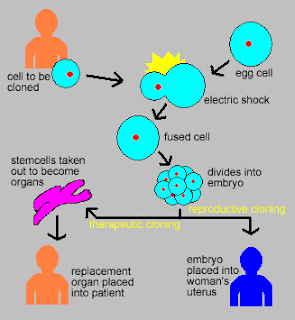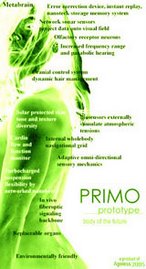 Graphic courtesy of Michigan State University.
Graphic courtesy of Michigan State University. There have been numerous cases of stem cell growth for therapeutic purposes, such as the regeneration of skin and heart tissue, and the pharming and transplantation of animal organs into human patients, i.e. the Robert Pennington case.
Our generation of bio-scientists has also cloned mice and sheep, i.e. the case of Dolly. Therefore, is not the cloning of humans the most ‘natural’ next step in our progression in human enhancement?
The process followed in stem cell regeneration is similar to the one followed in cloning. The only distinguishing factor is the final stage, whereby the cloned cell could either be used for stem cell regeneration or to impregnate- refer to the graphic above.
Theoretically this is possible, and to some extent practically possible as displayed in the case of Dolly, the first cloned sheep. However, some bio-scientists have gone as far as brazenly claiming to have successfully cloned humans. Dr Brigitte Boisellier of Clonaid is one of them.
In an interview with Sir David Frost on "BBC Breakfast with Frost" (November 23, 2003) Dr Boisellier claimed that her cloning company had already cloned five babies (without any defects), and the eldest was almost a year at the time of the interview (having been born in December 26, 2002).
According to Dr Boisellier it is “[e]asier to clone human beings than it is to clone any other mammals”. She also claimed that Clonaid had already been cloning humans for over 25 years.
In recent years Clonaid has been shadowed with fraud claims as Dr Boisellier has failed to provide any evidence of her clone babies. This was her argument during the interview:
DR BRIGITTE BOISSELIER: "Okay. For me it's not a problem, it's for the parents. You know, they have their baby, they want to lead a happy life and they want to protect the child, the children. So for me, I respect that even if it was hard. Can you imagine like last year when I had to say well it's impossible to give the proof because of them saying no. But in the second, I think the second generation might be easier, ... the second ... babies ..."
Although I am eager to jump onto the Clonaid train of endless possibilities, I am afraid that I remain as sceptical of her abilities at cloning humans as bioethicist Professor Nigel Cameron of the Centre for Bioethics and Public Policy.
NIGEL CAMERON: "I think virtually every scientist in the world would say that it is impossible at the moment to clone live-born human beings. That's one clear fact. There's a lot of research into aging processes but this stem cell stuff is so hard to control at the moment I think it will be a long way away."
Until further evidence I too share this sentiment. However, I suspect I am far more positive about the prospect of successful cloning of humans than Professor Cameron.
Stay tuned for the next blog post, which will be an infographic on how one (theoretically) goes about cloning a human. Then decide for yourself if human cloning is or isn't the next 'natural' step from stem growth in human enhancement.

2 comments:
I thought it was very wierd but Clonaid had a stall at Pride London. Take a look.
http://bryndlewindle.blogspot.com/2007/07/pride-wierdness-clonaid.html
Bryn
I think the possibility of human cloning is interesting, but I have to say that I am not sure what people want to achieve from it at a personal level.
What would you want to achieve from it yourself? Bryn
Post a Comment